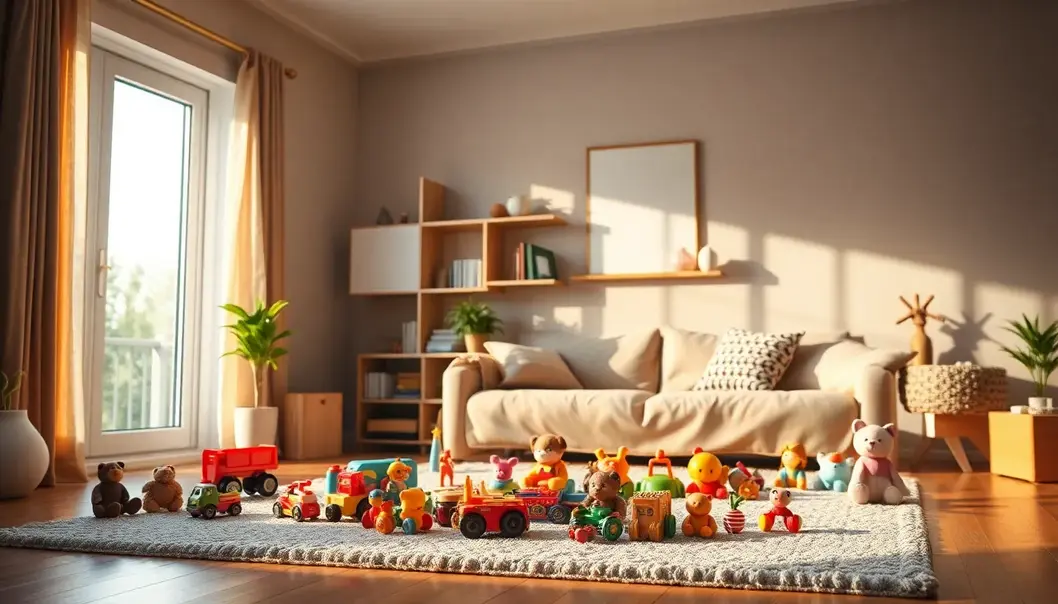As newlyweds embarking on a journey of love and family, the prospect of creating a nurturing environment for your future children is a shared dream that inspires a world of imagination. The laughter of children playing, their eyes sparkling with joy, is a melody that sings of hope and potential. Unraveling the psychology behind why kids adore toys not only enlightens us about childhood development but also echoes a deeper understanding of nurturing joy and creativity. In this article, we will explore the enthralling world of toys through the eyes of children, discovering what magic lies within these playful treasures.
The Magical World of Play

Delving into the realm of play is akin to entering a world where imagination knows no bounds. Here, toys transform into tools that unlock cognitive wonders, fostering emotional and social growth essential for every child. The simple act of play is a conduit through which children explore their environment, paving pathways in the brain that are critical for later life.
At the heart of this magical world is the unstructured, imaginative play with toys that allows children to experiment with their creativity. A dollhouse isn’t just a collection of miniature furniture; it becomes an entire universe where children can simulate adult responsibilities, from household chores to familial interactions. This form of play is invaluable for cultivating problem-solving skills and adaptive thinking.
Moreover, toys serve as bridges between fantasy and reality, offering children a medium to process emotions and develop empathy. For instance, when children role-play as heroes or caregivers, they’re not just engaging in entertainment; they’re practicing emotional responses and honing their understanding of social roles. These interactions are crucial in learning how to navigate relationships with both peers and family members.
Through play, children also develop language skills. When children engage in storytelling with their toys, they are effectively practicing vocabulary and narrative structures. This is an intrinsic part of how children learn to communicate and express their feelings and needs more effectively.
In addition to cognitive and language development, play is a pivotal way for children to build emotional resilience. Toys can help children articulate and understand complex feelings, providing a safe space for them to explore fears and anxieties. Play often serves as an emotional barometer within family dynamics, as it can reveal underlying issues that a child might not express verbally.
Furthermore, familial participation in play can strengthen bonds. When children see parents and siblings engage with them in their magical worlds, it fosters an environment of trust and support. Family playtime is not just a leisure activity; it’s a dynamic learning experience that can reinforce emotional security and familial connections.
Thus, the enchanting allure of toys lies in their ability to act as portals to cognitive and emotional development, transforming the seemingly simple act of play into a fundamental cornerstone of growth and understanding.
The Psychological Threads of Attraction

Children are naturally drawn to toys with a fervor that can be both intense and enduring. This attraction stems from profound psychological roots, primarily their innate curiosity and the desire for exploration. From the moment they gain a semblance of agency over their movements, toys become essential tools for understanding the vast, mysterious world around them.
One of the core psychological reasons behind this attraction is a child’s intrinsic need to explore and understand environments. Toys serve as gateways that bridge the known and the unknown, offering a safe means to experiment and learn. For instance, a simple building block can become a conduit for understanding balance, gravity, and spatial relationships. Through such interactions, children not only enhance their cognitive abilities but also develop critical thinking skills as they hypothesize and test their interactions with toys.
Moreover, toys play a significant role in fostering independence. When children engage with toys alone, they learn to focus, make decisions, and solve problems independently. This solitary play encourages autonomy, as children often create their own rules and frameworks without external oversight. By engaging in such self-directed play, they learn the important skill of self-regulation, honing their ability to plan, execute, and adapt.
Beyond cognitive and independent development, toys also contribute significantly to a child’s understanding of themselves and their environment. Through role-play and imitation, children use toys to explore different identities and scenarios, testing various social roles and behaviors. For instance, when playing with action figures or dolls, children may reenact familiar scenarios or invent entirely new ones. This form of play is crucial in the development of empathy and social understanding, as it allows children to see the world from multiple perspectives.
The interaction with toys becomes a mirror reflecting a child’s burgeoning understanding of societal norms and behaviors. As children navigate these playful landscapes, they also construct a personal narrative that helps them process emotions and comprehend their place within both family and broader societal contexts.
By engaging extensively with toys, children develop a complex tapestry of skills and insights that are foundational for their emotional and intellectual growth. These psychological threads, woven through countless hours of exploration and imagination, lay the groundwork for not only a child’s immediate development but also their lifelong relationship with learning and creativity.
Final words
Toys are more than mere playthings; they are the threads that weave the tapestry of childhood wonder and development. Understanding the fascination children have with toys can enrich your journey as future parents, fostering an environment that promotes growth, joy, and a lasting bond within your family. Embrace the magic of play and allow it to guide your dreams of nurturing a joyful sanctuary for your children.
Dive deeper into the world of play and explore the toys that could fill your home with laughter and joy.
Learn more: https://toyloversparadise.com
About us
Toy Lovers’ Paradise offers a curated selection of toys that inspire creativity and joy, fostering developmental growth and family togetherness for children of all ages.

